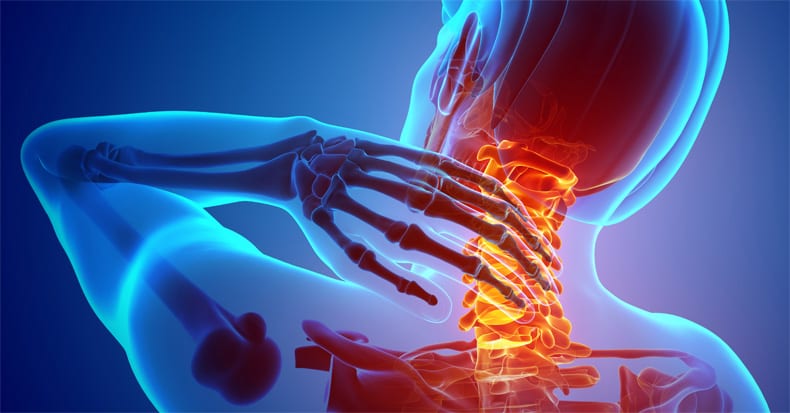Neck pain is one of those conditions that virtually everyone has had at some point in time. The degree of how it can affect one’s life is highly variable—from minimal functional limitations to total disability. So where does neck pain come from and why are the “facet joints” so important?
The anatomy of a vertebrae in the spine is quite unique. There are seven vertebrae that make up the cervical spine. The top vertebra in the neck is called the atlas (C1), which basically swivels around the axis (C2). The atlas and axis allow us to rotate our head, such as when checking traffic or looking over our shoulder. The top two vertebrae (c1 and c2) are uniquely shaped, while the remaining cervical vertebrae (c3-7) are very similar in appearance with a vertebral body in the front and a bony ring with spinous process on the back that protects the spinal cord.
Between each vertebral body is a spinal disk and the processes are connected to the processes of the vertebrae above and below by facet joints.
The facet joints are a major source of neck pain, and injuries to the facet joints are commonly referred as “cervical facet syndrome.” Biomechanical studies show that the capsules that surround the facet joints have many nerve endings and can become highly strained when large amounts of force are applied to the body, such as during a motor vehicle collision.
When this occurs, the combination of inflammation and capsular deformation can lower the threshold in various pain producing receptors in the facet joint. This results in persistent neck pain which can increase with normal movement.
There are many treatment approaches available for persistent neck pain arising from the facet joints, such as spinal manipulation and joint mobilization performed by a doctor of chiropractic.
Home-based self-care recommendations may include specific exercises to stretch and strengthen the cervical spine, nutritional advice, home cervical traction units, a cervical pillow, and cervical curve-retaining techniques.


